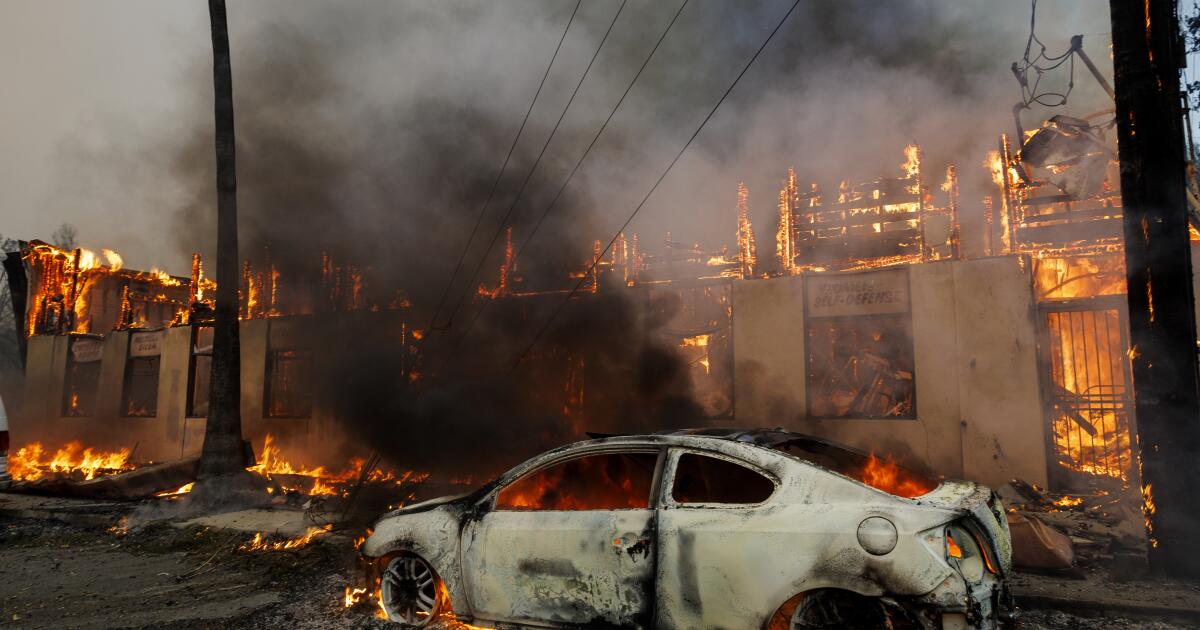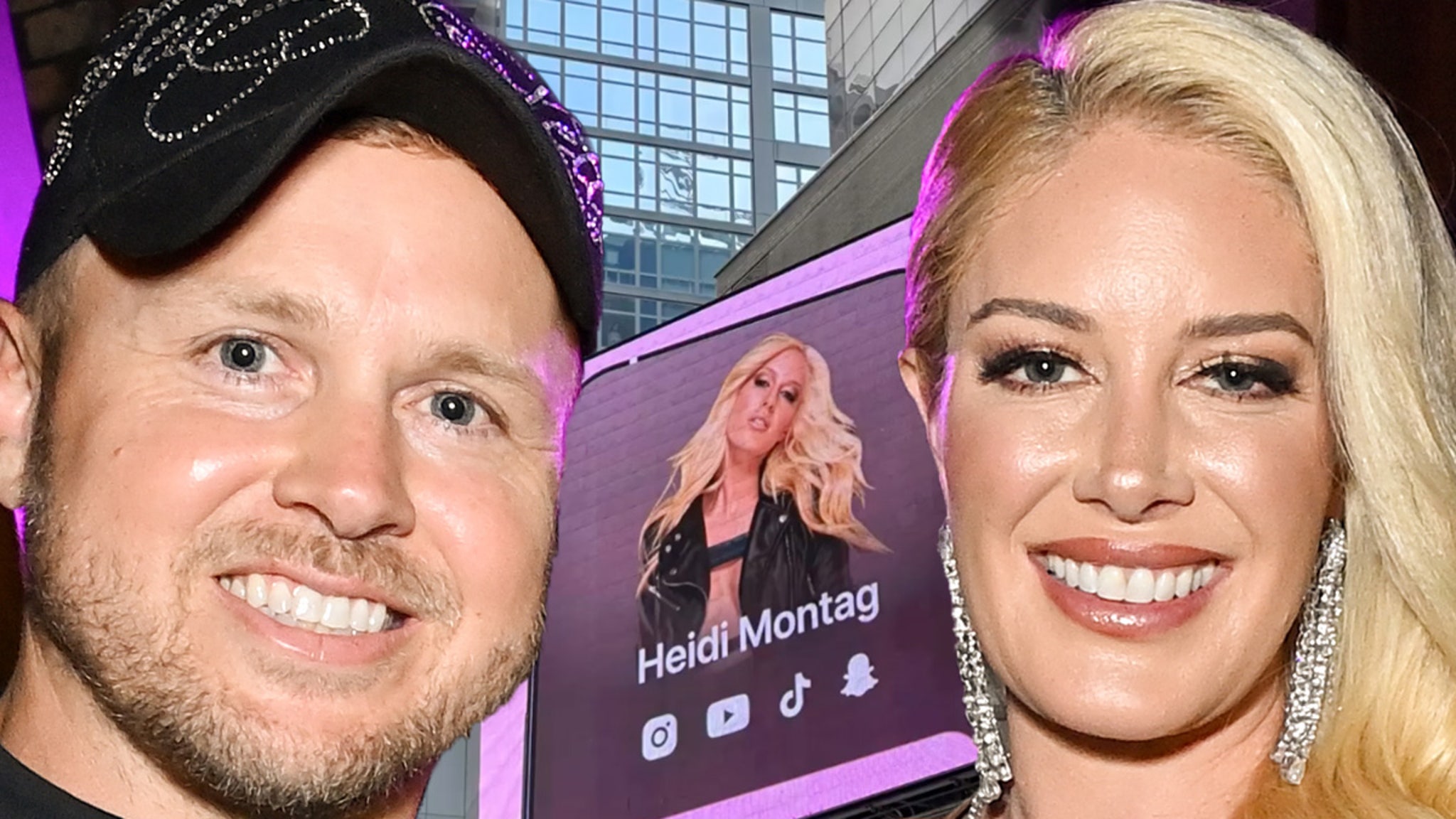Business
Inside the Private Writings of Caroline Ellison, Star Witness in the FTX Case

Three months before the cryptocurrency market imploded last year, Caroline Ellison, the 27-year-old chief executive of the crypto hedge fund Alameda Research, was racked with self-doubt.
“I have been feeling pretty unhappy and overwhelmed with my job,” Ms. Ellison wrote in a Google document in February 2022. She added: “At the end of the day I can’t wait to go home and turn off my phone and have a drink and get away from it all.”
Ms. Ellison had a lot on her mind. She did not think that she was well suited to running Alameda or was a particularly decisive leader, she wrote in another Google document. She was also going through a breakup with Sam Bankman-Fried, the billionaire entrepreneur who had founded Alameda and then FTX, one of the world’s largest cryptocurrency exchanges. They had dated on and off, and Ms. Ellison worried about “making things weird” and “causing drama.”
“It doesn’t really feel like there’s an end in sight,” she wrote in the February 2022 document.
Now Ms. Ellison is poised to be a star witness at Mr. Bankman-Fried’s criminal trial, which is scheduled for Oct. 2.
Mr. Bankman-Fried, 31, is accused of misusing billions of dollars taken from customer accounts and faces eight counts of fraud and election law violations. His spectacular downfall, which sent FTX and Alameda into bankruptcy, transformed Ms. Ellison from a powerful — yet relatively private — figure into a target of tabloid speculation. In December, she pleaded guilty to fraud charges and agreed to cooperate with the federal prosecutors investigating her former boyfriend.
His case is speeding toward a courtroom showdown in Manhattan. Two other top FTX executives, Nishad Singh and Gary Wang, have also pleaded guilty and agreed to cooperate. In June, after weeks of legal wrangling over the charges against Mr. Bankman-Fried, the judge in the case set a brisk schedule for the run-up to the trial, asking prosecutors to come up with a witness list and produce other final materials. Prosecutors are expected to begin preparing at least some witnesses in August, two people with knowledge of the matter said.
As Mr. Bankman-Fried’s sometime-girlfriend and one of his earliest hires, Ms. Ellison had unique insight into the FTX founder. She also recorded many of her thoughts in writing, making observations about her personal and professional life in a handwritten diary and on Google documents that have circulated among lawyers involved in the case, according to documents reviewed by The New York Times and four people familiar with the investigation.
The documents, which have not been previously reported, offer new insight into Ms. Ellison’s psychology during the final months of FTX. Ms. Ellison, now 28, was a prolific writer whose Tumblr posts about Harry Potter and Jane Austen have been widely dissected. But the Google documents are more personal and raw, with some directly addressed to Mr. Bankman-Fried, illustrating the complexity of their relationship and her ambivalence about Alameda.
In one Google document addressed to Mr. Bankman-Fried in April 2022, Ms. Ellison wrote that an earlier breakup with him had “significantly decreased my excitement about Alameda.” Life at the hedge fund, she added, “felt too associated with you in a way that was painful.”
A representative for Ms. Ellison’s legal team and a lawyer for Mr. Bankman-Fried declined to comment. A spokesman for the U.S. attorney’s office for the Southern District of New York in Manhattan, the unit prosecuting the case, also declined to comment.
Ms. Ellison, a Stanford graduate, got to know Mr. Bankman-Fried at Jane Street, the quantitative trading firm where he worked after college. They shared a commitment to effective altruism, the charitable movement that has gained adherents in the tech and finance industries.
After Mr. Bankman-Fried left Jane Street to start Alameda in 2017, he recruited Ms. Ellison as a trader. In 2021, he promoted her to co-chief executive, alongside another early hire, Sam Trabucco.
Mr. Bankman-Fried and Ms. Ellison also started an unsteady romantic relationship, with multiple breakups and reconciliations. At times, Ms. Ellison worried that Mr. Bankman-Fried thought she wasn’t good enough. When he was around, she wrote in the February 2022 Google document, she had “an instinct to shrink and become smaller and quieter and defer to others.”
After one split, Ms. Ellison cut off communication with Mr. Bankman-Fried. “I felt pretty hurt/rejected,” she wrote in the April 2022 Google document. “Not giving you the contact you wanted felt like the only way I could regain a sense of power.”
By last year, Mr. Bankman-Fried had become one of the world’s most prominent crypto entrepreneurs, his face plastered on billboards and magazine covers. His fame seemed to make life at FTX and Alameda harder for Ms. Ellison.
Staying put meant “having to be around you all the time, hearing people talk about how great you are all the time,” she wrote in the April 2022 document.
Ms. Ellison was compensated far less generously than other top executives at FTX and Alameda, though it’s unclear whether she was aware of it. According to court filings, the exchange’s founders and other key employees received $3.2 billion in payments and loans. Of that total, $6 million went to Ms. Ellison, compared with $587 million for Mr. Singh, FTX’s head of engineering, and $246 million for Mr. Wang, one of the founders. Mr. Bankman-Fried received $2.2 billion.
In May 2022, the crypto market crashed, sending coin prices spiraling and plunging several prominent companies into bankruptcy. During the crisis, regulators have asserted, Mr. Bankman-Fried, Mr. Wang, Mr. Singh and Ms. Ellison filled a hole in Alameda’s accounts using billions in customer funds deposited with FTX.
Even before then, Ms. Ellison doubted her own abilities. In the April 2022 document, she made a list of areas where she struggled, including “leadership” and “decisiveness.”
“Running Alameda doesn’t feel like something I’m that comparatively advantaged at or well suited to do,” she wrote.
By last fall, Mr. Bankman-Fried had lost faith in Alameda. He considered shutting the firm, according to court records, and invested more than $400 million in another trading company, Modulo Capital, which was led by a different former Jane Street trader whom he had also dated.
Ms. Ellison expressed jealousy and resentment toward Modulo in some of her writings, as well as a feeling that she was being squeezed out, two people who have seen the documents said.
Mr. Bankman-Fried’s business empire collapsed in November after a run on deposits exposed an $8 billion deficit.
“I just had an increasing dread of this day that was weighing on me,” Ms. Ellison wrote to him in a message that month, which was excerpted in court records. “Now that it’s actually happening it just feels great to get it over with.”
In December, Mr. Bankman-Fried was arrested in the Bahamas, where FTX was based, and taken to a prison not far from the luxury penthouse that he and Ms. Ellison had shared with eight other roommates, including Mr. Wang and Mr. Singh. Mr. Bankman-Fried is now under house arrest at his parents’ home in Palo Alto, Calif.
People who know Ms. Ellison say they have been struck by her earnestness and her willingness to admit her own failings. In court in December, she said she was “truly sorry” for committing fraud. “I knew that it was wrong,” she said.
Ms. Ellison is expected to repeat that assertion at Mr. Bankman-Fried’s trial, which is expected to last four or five weeks. Much of the trial will revolve around messages that Mr. Bankman-Fried and the three cooperators exchanged on the messaging app Signal, two people briefed on the matter said.
As a woman in the male-dominated crypto industry, Ms. Ellison may appear more sympathetic to the jury than the other cooperators, lawyers familiar with the case said. In interviews last year, Mr. Bankman-Fried shifted some blame for the collapse to Alameda, saying he had little involvement in the hedge fund’s day-to-day management.
Moira Penza, a former federal prosecutor, said that the best government cooperators accepted blame on the witness stand and that the “power differential” between Ms. Ellison and Mr. Bankman-Fried could make her a compelling voice.
“This does not strike me as an effective strategy for the defendant to be blaming down,” Ms. Penza said. “Especially with someone who was once a romantic partner.”

Business
California drops zero-emission truck rules after inaction by Biden's EPA

California government’s plan to phase out heavy-duty diesel trucks and diesel locomotives has been derailed.
The ambitious plan aimed at reducing local pollution and global greenhouse gases required special waivers from the federal government. The Biden administration hadn’t granted the waivers as of this week, and rather than face almost certain denial by the incoming Trump administration, the state withdrew its waiver request.
That means the far-reaching regulations issued by the California Air Resources Board in 2022 to ban new diesel truck sales by 2036 and force fleet owners to take them off the road by 2042 won’t be enforced. Known as the Advanced Clean Fleets rule, the idea was to replace those trucks with electric and hydrogen-powered versions, which dramatically reduce emissions but are currently two to three times more expensive.
“While we are disappointed that U.S. EPA was unable to act on all the requests in time, the withdrawal is an important step given the uncertainty presented by the incoming administration that previously attacked California’s programs to protect public health and the climate and has said will continue to oppose those programs,” CARB Chair Liane Randolph said in a prepared statement.
Environmentalists reacted with deep disappointment.
“To meet basic standards for healthy air, California has to shift to zero-emissions trucks and trains in the coming years. Diesel is one of the most dangerous kinds of air pollution for human health,” Paul Cort, director of Earthjustice’s Right to Zero campaign, said in a prepared statement. “We’ll be working tirelessly in the coming years — and calling on Gov. [Gavin] Newsom, state legislators, and our air quality regulators to join us — to clean up our freight system and fix the mess [U.S.] EPA’s inaction has created.”
The trucking industry is pleased at the result, but hopes to continue working with California on environmental issues.
“This rule was flawed, and was not reflective of reality,” said Matt Schrap, chief executive at the Harbor Trucking Assn. “Ideally this is an opportunity to take a step back and look at a program that would be more sustainable.”
Trucking representatives had filed a lawsuit to block the rules, arguing they would cause irreparable harm to the industry and the wider economy. Train operators said no zero-emission locomotives exist on the commercial market.
Schrap said “the most important thing is the EPA could have issued the waiver and they didn’t.”
The EPA said it acknowledges California’s withdrawal of the waiver requests “and as a result is taking no further action on CARB’s prior requests and considers these matters closed.”
President-elect Donald Trump is a champion of the fossil fuel industry, making it unlikely that his administration would have approved the California waivers. The state could, however, pursue waivers at some point in the future.
Under the federal Clean Air Act, California is allowed to set its own air standards, and other states are allowed to follow California’s lead. But federal government waivers are required. Most of California’s waivers have been granted, including approval in December of a California ban on new sales of gas-powered cars and light trucks by 2035.
Business
Elon Musk, Mark Zuckerberg and Jeff Bezos to Attend Trump’s Inauguration

Bezos, Zuckerberg and Coke at the inauguration
Corporate America had already raced to donate big sums to Donald Trump’s record-breaking inaugural fund. Now some of its leaders appear eager to jockey for prominent positions at the inauguration next week.
It’s a new reminder that for some of the nation’s biggest businesses, forging close ties to a president-elect who is promising hard-hitting policies like tariffs is a priority this time around.
Jeff Bezos and Mark Zuckerberg are expected to be on the inauguration dais, according to NBC News, alongside Elon Musk and several cabinet picks.
The presence of Musk isn’t a surprise, given the Tesla chief’s significant support of and huge influence over Trump. But the other tech moguls have only more recently been seen as supporters of the administration. (Indeed, Bezos frequently sparred with Trump during his first presidential term.)
It’s the latest effort by Bezos and Zuckerberg to burnish their Trump credentials. At the DealBook Summit in December, Bezos — whose Amazon has faced scrutiny under the Biden administration and whose Blue Origin is hoping to win government rocket contracts — said that he was “very hopeful” about Trump’s efforts to reduce regulation.
And Zuckerberg recently announced significant changes to Meta’s content moderation policy, including relaxing restrictions on speech seen as protecting groups including L.G.B.T.Q. people that won praise from Trump and other conservatives. On the inauguration front, Zuckerberg is also co-hosting a reception alongside the longtime Trump backers Miriam Adelson, Tilman Fertitta and Todd Ricketts.
Both tech moguls have visited Mar-a-Lago since the election, with Zuckerberg having done so more than once.
Coca-Cola took a different tack. The drinks giant’s C.E.O., James Quincey, gave Trump what an aide called the “first ever Presidential Commemorative Inaugural Diet Coke bottle.”
More broadly, business leaders want a piece of the inauguration action. The Times previously reported that the Trump inaugural fund had surpassed $170 million, a record, and that even major donors have been wait-listed for events.
Others are throwing unofficial events around Washington, including an “Inaugural Crypto Ball” that will feature Snoop Dogg, with tickets starting at $5,000, The Wall Street Journal reports.
It’s a reminder that C.E.O.s are reading the room, and preparing their companies for a president who has proposed creating an “External Revenue Service” to oversee what he has promised will be wide-ranging tariffs.
David Urban, a longtime Trump adviser who’s hosting a pre-inauguration event, told The Journal, “This is the world order, and if we’re going to succeed, we need to get with the world order.”
-
In other Trump news: The president-elect is expected to appear via videoconference at the World Economic Forum in Davos, Switzerland, which starts on Inauguration Day, according to Semafor.
HERE’S WHAT’S HAPPENING
Investors brace for the latest inflation data. The Consumer Price Index report, due out at 8:30 a.m. Eastern, is expected to show that inflation ticked up last month, most likely because of climbing food and fuel costs. Global bond markets have been rattled as slow progress on slowing inflation has prompted the Fed to slash its forecast for interest rate cuts.
More Trump cabinet picks will appear before the Senate on Wednesday. Senator Marco Rubio of Florida, the choice for secretary of state, is expected to field questions about his views on the Middle East, Ukraine and China, but is expected to be confirmed. Russell Vought, the pick to run the Office of Management and Budget, will most likely be asked about his advocacy for drastically shrinking the federal government, a key Trump objective. And Sean Duffy, the Fox Business host chosen to lead the Transportation Department, will probably face questions on how he would oversee matters including aviation safety and autonomous vehicles, the latter of which is a priority for Elon Musk.
Meta plans to lay off another 5 percent of its employees. Mark Zuckerberg, the tech giant’s C.E.O., told staff members to prepare for “extensive performance-based cuts” as the company braces for “an intense year.” The social media giant faces intense competition in the race to commercialize artificial intelligence.
A new bill would give TikTok a reprieve from a ban in the United States. Senator Ed Markey, Democrat of Massachusetts, said he planned to introduce the Extend the TikTok Deadline Act, which would give the video platform 270 additional days to be divested from its Chinese parent, ByteDance before being blacklisted. It’s the latest effort to buy TikTok time, as the app faces a Jan. 19 deadline set by a law; President-elect Donald Trump has opposed the potential ban as well.
A question of succession
JPMorgan Chase and BlackRock, the giant money manager, just reported earnings. (In short: Both handily beat analyst expectations.)
But the Wall Street giants are likely to face questioning on a particular issue on Wednesday: Which top lieutenants are in line to replace their larger-than-life C.E.O.s, Jamie Dimon and Larry Fink.
Who’s out:
-
Daniel Pinto, who had long been Dimon’s right-hand man, said he would officially drop his responsibilities as JPMorgan’s C.O.O. in June and retire at the end of 2026. Jenn Piepszak, the co-C.E.O. of the company’s core commercial and investment bank, has become C.O.O.
-
And Mark Wiedman, the head of BlackRock’s global client business and a top contender to succeed Fink, is planning to leave, according to news reports.
What Wall Street is gossiping about JPMorgan: Even in taking the C.O.O. role, JPMorgan said that Piepszak wasn’t interested in succeeding Dimon “at this time.” DealBook hears that while she genuinely appears not to want to pursue the top job, the phrasing covers her in case she changes her mind.
For now, that means the most likely candidates for the top spot are Marianne Lake, the company’s head of consumer and community banking; Troy Rohrbaugh, the other co-head of the commercial and investment bank; and Doug Petno, a co-head of global banking.
The buzz around BlackRock: Wiedman reportedly didn’t want to keep waiting to succeed Fink and is expected to seek a C.E.O. position elsewhere. (So sudden was his departure that he’s forfeiting about $8 million worth of stock options and, according to The Wall Street Journal, he doesn’t have another job lined up yet.)
Fink said on CNBC on Wednesday that Wiedman’s departure had been in the works for some time, with the executive having expressed a desire to leave about six months ago.
Other candidates to take over for Fink include Martin Small, BlackRock’s C.F.O.; Rob Goldstein, the firm’s C.O.O.; and Rachel Lord, the head of international.
But Dimon and Fink aren’t going anywhere just yet. Dimon, 68, said only last year that he might not be in the role in five years. And Fink, 72, said in July that he was working on succession planning: “When I do believe the next generation is ready, I’m out.”
The S.E.C. gets in a final shot at Musk
Another battle between Elon Musk and the S.E.C. erupted on Tuesday, with the agency suing the tech mogul over his 2022 purchase of Twitter.
It’s unclear what happens to the lawsuit once President-elect Donald Trump, who counts Musk as a close ally, takes office. But the agency’s reputation as an independent watchdog may be at stake.
A recap: The S.E.C. accused Musk of violating securities laws in his $44 billion acquisition of the social media company.
The agency said that Musk had failed to disclose his Twitter ownership stake for a pivotal 11-day stretch before revealing his intentions to purchase the company. That breach allowed him to buy up at least $150 million worth of Twitter shares at a lower price — to the detriment of existing shareholders, the agency argues.
The S.E.C. isn’t just seeking to fine Musk. It wants him to pay back the windfall. “That’s unusual,” Ann Lipton, a professor at Tulane Law School, told DealBook.
Alex Spiro, Musk’s lawyer, called the latest action a “sham” and accused the agency of waging a “multiyear campaign of harassment” against him.
The showdown sets up a tough question for the S.E.C. Will Paul Atkins, the president-elect’s widely respected pick to lead the agency, drop the case? Such a move could call the bedrock principle of S.E.C. independence into question.
Jay Clayton, who led the agency during Trump’s first term, earned the respect of the business community for running it in a largely drama-free manner. It was under Clayton that the S.E.C. sued Musk over his statements about taking Tesla private.
Musk, who is set to become Trump’s cost-cutting czar and is expected to have office space in the White House complex, has called for the “comprehensive overhaul” of agencies like the S.E.C. The billionaire said he would also like to see “punitive action against those individuals who have abused their regulatory power for personal and political gain.”
-
In related news: The Consumer Financial Protection Bureau sued Capital One, accusing it of cheating its depositors out of $2 billion in interest payments.
THE SPEED READ
Deals
-
DAZN, the streaming network backed by the billionaire businessman Len Blavatnik, is closing in on funding from Saudi Arabia’s sovereign wealth fund as the kingdom continues to expand its sports footprint. (NYT)
-
The Justice Department sued KKR, accusing the investment giant of withholding information during government reviews for several of its deals. KKR filed a countersuit. (Bloomberg)
-
OpenAI added Adebayo Ogunlesi, the billionaire co-founder of the infrastructure investment firm Global Infrastructure Partners, to its board. (FT)
Politics and policy
Best of the rest
We’d like your feedback! Please email thoughts and suggestions to dealbook@nytimes.com.
Business
For uninsured fire victims, the Small Business Administration offers a rare lifeline

As wildfires continue to burn around Southern California, thousands of business owners, homeowners and renters are confronting the daunting challenge of rebuilding from the ashes. For some number of them, the road ahead will be all the more difficult because they didn’t have any or enough insurance to cover their losses. For them, the U.S. Small Business Administration is a possible lifeline.
The SBA, which offers emergency loans to businesses, homeowners, renters and nonprofits, is among the few relief options for those who don’t have insurance or are underinsured. Uninsured Angelenos can also apply for disaster assistance through the Federal Emergency Management Agency, or FEMA.
The current wildfires are ravaging a state that was already in the midst of a home insurance crisis. Thousands of homeowners have lost their insurance in recent years as providers pull out of fire-prone areas and jack up their prices in the face of rising risk.
“For those who are not going to get that insurance payout, this is available,” Small Business Administration head Isabella Casillas Guzman said in an interview during a recent trip to the fire areas. “The loans are intended to fill gaps, and that is very broad.”
About one-third of businesses don’t have insurance and three-quarters are underinsured, Guzman said.
“There will be residual effects around the whole community,” she said. “Insurance will not cover this disaster.”
Businesses, nonprofits and small agricultural cooperatives can apply for an economic injury loan or a physical damage loan through SBA. Homeowners are eligible for physical damage loans. Economic injury loans are intended to help businesses meet ordinary financial demands, while physical damage loans provide funds for repairs and restoration. People can apply online and loans must be repaid within 30 years.
Renters can receive up to $100,000 in assistance, homeowners up to $500,000 and businesses up to $2 million, according to Guzman. Homeowners and renters who cannot get access to credit elsewhere can qualify for loans with a interest rate of 2.5%. The SBA determines an applicant has no credit available elsewhere if they do not have other funds to pay for disaster recovery and cannot borrow from nongovernment sources.
Interest rates for homeowners and renters who do have access to credit elsewhere are just over 5%. Loans for businesses could come with interest rates of 4% or 8% depending on whether the business has other credit options.
An applicant must show they are able to repay their loan and have a credit history acceptable to the SBA in order to be approved. The loans became available following President Biden’s declaration of a major disaster in California.
“We’ve already received hundreds of applications from individuals and businesses interested in exploring additional support,” Guzman said. “We know the economic disruption may not be contained to the footprint of any evacuation zones or power outages.”
People who don’t have insurance or whose insurance doesn’t cover the entirety of their losses are eligible for loans, Guzman said. While many will use the funds to start from scratch after losing their property to the fires, businesses that are still standing can also apply for support to cover lost revenue.
Guzman was not able to estimate the total value of loans they expect to offer in California but said the organization is on solid financial footing after temporarily running out of funds in October.
“Funding has been replenished by Congress, and we expect to be able to coordinate closely with Congress,” Guzman said. “We’re fully funded and in a good position to provide support.”
-

 Health1 week ago
Health1 week agoOzempic ‘microdosing’ is the new weight-loss trend: Should you try it?
-
/cdn.vox-cdn.com/uploads/chorus_asset/file/25822586/STK169_ZUCKERBERG_MAGA_STKS491_CVIRGINIA_A.jpg)
/cdn.vox-cdn.com/uploads/chorus_asset/file/25822586/STK169_ZUCKERBERG_MAGA_STKS491_CVIRGINIA_A.jpg) Technology6 days ago
Technology6 days agoMeta is highlighting a splintering global approach to online speech
-

 Science4 days ago
Science4 days agoMetro will offer free rides in L.A. through Sunday due to fires
-
/cdn.vox-cdn.com/uploads/chorus_asset/file/25821992/videoframe_720397.png)
/cdn.vox-cdn.com/uploads/chorus_asset/file/25821992/videoframe_720397.png) Technology1 week ago
Technology1 week agoLas Vegas police release ChatGPT logs from the suspect in the Cybertruck explosion
-

 Movie Reviews1 week ago
Movie Reviews1 week ago‘How to Make Millions Before Grandma Dies’ Review: Thai Oscar Entry Is a Disarmingly Sentimental Tear-Jerker
-

 Health1 week ago
Health1 week agoMichael J. Fox honored with Presidential Medal of Freedom for Parkinson’s research efforts
-

 Movie Reviews1 week ago
Movie Reviews1 week agoMovie Review: Millennials try to buy-in or opt-out of the “American Meltdown”
-

 News1 week ago
News1 week agoPhotos: Pacific Palisades Wildfire Engulfs Homes in an L.A. Neighborhood














